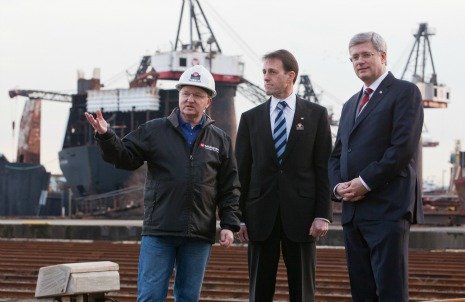By Gagandeep Ghuman
Published: Oct 2, 2015
THE LAWN at Osgood Hall Laws School was in a poor state and so was the food served at the cafeteria when John Weston became one of the two student members on the university board of governors. Students complained to the board and one of John Weston’s first political acts was to try to fix the lawn and the food.
To fix something that is at fault is a deeply ingrained value for John Weston, the Conservative Party candidate, and it powers his politics to this day. His stint at the Osgoode was too short to fix the lawns although he did fix them when he got on the UBC board of governors, he recalls with a smile.
It may be a long way from fixing lawns to getting his bills passed in the parliament but Weston says the principle remains the same: “I always feel if there is something wrong, something at fault, I need to do something about it.”
Weston grew up in South Vancouver and attended the St. George School and studied government at Harvard University before enrolling for a law degree at Osgoode Hall at York University in Toronto. His father, Stanley Weston, was a well-known international environment consultant, someone who could “grow grass on a golf ball.”
A 350-year old Samurai sword belonging to Stanley Weston can still be found in MP Weston’s Ottawa home. A POW in Singapore liberated by the Allies in 1945, Stanley survived three-and-a-half years as a Japanese prisoner, where he was forced to help build the Japanese railway that ran across the bridge over the River Kwai. By the time he returned to Vancouver, he’d lost almost half his body weight, Weston recalls in an interview with an Ottawa-based paper. The sword, he said, stood as a mute testimony to his father’s service past and to the duty to protect and serve the country.
Weston is also the nephew of late Victoria Cross winner Ernest Smokey Smith so service to community and country is deeply rooted in the family history, he says. “My parents had a strong influence on me and they taught me to make the community better, to never take for granted the gifts you have been blessed with, to be modest, to love God and to serve other people and your country,” he said.
Following on that advice of contributing to society, Weston started the Canadian Food for the Hungry International, a Christian agency that helps vulnerable people in developing countries. Weston has been involved with the Progressive Conservative Party since the 80s, which he signed in on as a secretary of the party’s riding association in Vancouver South. As an international lawyer, Weston also lived in Asia. In Taiwan, he helped set up Canada’s trade office and later founded what he calls the ‘world’s smallest law firm’ and later came back to Vancouver and founded the Pan Pacific Law Corporation and Access Law Group. It was in the late 1990s that Weston started working as a legal advisor to the then MP John Reynolds. When Reynolds resigned, his friends and community supporters urged him to see party nomination to represent the riding in Ottawa.
“I watched as Reynolds announced he wasn’t going to run again and the phones started ringing. We consulted with family members and friends and people with political experience and decided that this was an opportunity to serve,” he recalls.
Since being re-elected in the 2011 federal election, Weston has served on the Citizenship and Immigration Committee and has also been a member of the Official Languages Committee. Among politicians, Weston is inspired by Winston Churchill, for his flourish with the English language and his ability to bring people together on one platform. Finding common ground among people with diverse background, it’s what Weston says he is most passionate about. It’s no surprise that his role model in Canadian politics is none other than Canada’s first Prime Minister and Father of Confederation, Sir John Macdonald.
“I admire the founder John Macdonald for having a vision for our country, and I think it’s important to keep that vision alive of a country that is marked by equality before the law,” he says.
Even though he admires strong leadership, Weston says he has learned to become aware of the critical nature of having passionate and engaged people work with you. In the last four years, he says he has identified 50 core sectors in the riding from where he gets regular advice on policy and community issues. One of the successes of consulting with the community, Weston gave an example, was the changes to Registered Retirement Income Funds, which lowered the minimum amount seniors must take out of their retirement funds. A group of seniors approached Weston who helped them make a submission to the House of Commons Finance Committee. The success, he says, was a good illustration of what can be done when citizens are involved.
“When I started, I saw much more emphasis on strength and energy and the intellect of the politicians. But now I realise it is a combination of a politician’s character and aptitude and a belief that a system can change, belief that a community and a country can be better,” he says.
But politics is not without its challenges, he says, and one among the biggest is taking care of a geographically and culturally diverse riding. It involved a network of staff and community groups and volunteers who keep him connected to the local issues even when he is far away in Ottawa. Despite the challenge of time and distance, Weston says he has managed to be one of the most productive members of parliament in Ottawa. Since 2008, only 46 Private Members’ Bills have been passed and two of those 46 are from him, one tackling Meth and Ecstasy and the other being the National Health and Fitness Day. An avid cyclist and a tireless promoter of exercise and healthy living, Weston recently rode the GranFondo Whistler. “Promoting health is my priority so I love skiing and biking and this is the world’s best place to do it,” he says, smiling.




